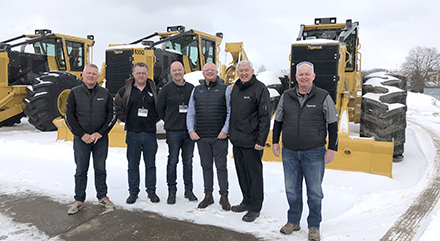
Warren Nolan (Tigercat), Trevor Els (C3), David Hazell (Onetrak), Mark Diedrichs (C3), Ken MacDonald (Tigercat CEO), Glen Marley (Tigercat)
Forestry logistics company C3, which began life as an on-wharf logistics business in New Zealand in the 1950s, is today a modern, leading edge provider of product and handling solutions on wharf and beyond, employing more than 1400 people. Source: Timberbiz
The company expanded its forestry operations to Australia in 2010 to assist with the marshalling of export logs from salvage harvest operations after Tropical Cyclone Yasi.
Today the business is one of Australia’s largest forest products logistics providers offering both in-field chipping and cut-to-length harvest and haulage solutions, along with port-side log marshalling and container packing services.
It operates across 23 locations in New Zealand and Australia including Queensland, Victoria, Tasmania, Western Australia, South Australia and New South Wales.
National Maintenance Manager Trevor Els, who joined the company when his previous employer, Edenborn, was purchased by C3 in 2016, looks after procurement and maintenance Australia-wide.
“C3’s sites across Australia used to work as independent entities but as the company grows, the focus is becoming more national and the sites work through a more aligned business mode,” Mr Els said. “Although we’re moving to a national focus, we’re very committed to continue to support the local communities in which we operate.
“It is a promising future for C3.
“Our WA entity has had its own transport business since inception, it continues to grow and we will see that across all sites in the future through LINX Cargo Care Group.”
And C3’s harvest and haulage operation in Portland, Victoria, recently quadrupled the size of its transport fleet and is now running 16 trucks.
“Another exciting new project is our entry into softwood in Tamworth, New South Wales,” Mr Els said.
C3 purchased three Tigercat LH855E harvesters for this project.
“The main reasons for purchasing Tigercat is due to the reliability of the machines and back-up support,” he said.
“For the past 8 years through my previous and current roles, I have been dealing with Tigercat and Onetrak, and the direct lines to the people I work with are excellent. Onetrak people are very committed to their customers and take huge responsibility in always providing the best support possible.
“In the past 18 months, our relationship has grown a lot thanks to open and honest communication. We have started new operations in new locations and Onetrak has made sure it has provided the service back-up to match our commitments.’’
Mr Els together with Tigercat District Manager Australia, Glen Marley and David Hazell from Onetrak visited the Tigercat factory earlier this year.
“The engineers took all of our feedback on-board and implemented improvements. Everything we have raised has been actioned,” Mr Els said.
Tigercat had made a lot of improvements to pumps for fuel economy, operator seats and one of the most exciting product developments was the new design of the shear heads.
“In general, Tigercat are long-lasting, robust and durable machines. The fuel economy is good and the reliability of the machines is definitely a key advantage. The technology, information and control you have access to is great,” Mr Els said.
“C3 hire a lot of millennial operators and provide on-site training. Young technologically skilled people today have learnt a lot what they know through interactive games of controlling a complete machine by a joystick, which is very similar to learning to drive a Tigercat, making it easy for them to learn.
“Tigercat just like Onetrak is a non-corporate family business. The engineers are very open minded, approachable and open to discuss new ideas, designs and modifications. We are like-minded when it comes to our customers as they really listen to understand our challenges locally and always help find a solution. Australian forestry is obviously a very different operation to the rest of the world.”







